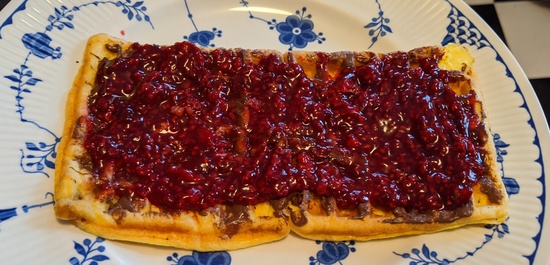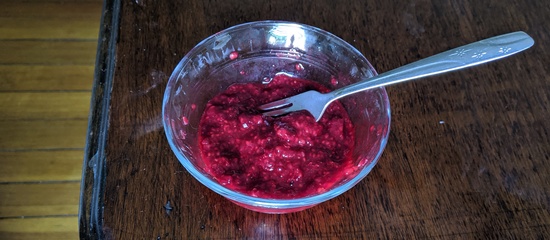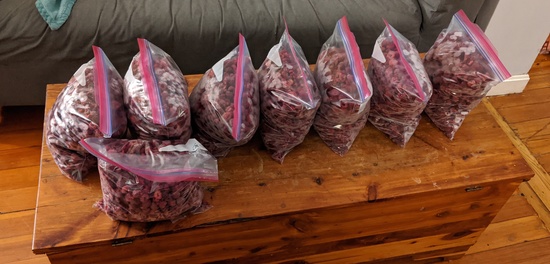Jam is obsolete
post by jefftk (jkaufman) · 2020-07-26T14:00:07.179Z · LW · GW · 24 commentsContents
24 comments
Jam is a very natural way to preserve fruit. The fruit is ripe only a small fraction of the year, you'd like to be able to eat it all year long, so you cook it with enough sugar that it won't go bad for a long time. But now that we have freezers, jam is obsolete.
When you make jam, you change the taste and texture of the fruit in several ways:
- Squishing the fruit makes it into a more consistent texture, suitable for spreading.
- Adding sugar makes the jam sweeter, and also much less healthy.
- Heat changes the flavor of the fruit, With more volatile flavors evaporating.
- Heat evaporates some of the water, thickening it (reducing).
- Heat releases pectin, or you add additional pectin, which gels the jam.
Some people make freezer jam, which skips the heated steps, and gives you a flavor much closer to fresh fruit. Because it hasn't been cooked thoroughly, you need to store it in the freezer, but since freezers are a thing now, that's not a problem.
We can go a step further, though, and just use frozen fruit. Take frozen raspberries, defrost them, and squish them up with a fork:

on eggy waffles, with nutella
This takes about a minute for defrosting, 10s for squishing, and is far superior to jam. Not so sweet, better flavor, and it's cheaper [1] and healthier as well!
Being able to store traditional jam in the refrigerator once you've opened it is an advantage, but I think it's a temporary one. Over time, I expect households will shift towards more freezer space relative to refrigerator space, as the quality of frozen food continues to rise. We got a chest freezer soon after we bought our house, and I'm glad we did!
[1] Our grocery store has raspberry jam for $2.75/lb, frozen
raspberries for $4.39/lb, and jam is ~40% fruit. Though since we have
the freezer space like raspberries a lot I've been buying them online,
30lb
at $3.08/lb shipped. A shipment fills 6-8 one-gallon ziplocs
depending on whether it ends up mostly whole or mostly pieces.
Comment via: facebook
24 comments
Comments sorted by top scores.
comment by Said Achmiz (SaidAchmiz) · 2020-08-02T22:25:59.073Z · LW(p) · GW(p)
Jam is tastier than frozen fruit. This, as far as I can see, ends the debate. (And if your jam is not tastier than frozen fruit, then you’re doing jam wrong.)
(… you are making the jam yourself, of course—aren’t you? Certainly there is little point in comparing to store-bought jam.)
comment by waveman · 2020-07-27T00:35:56.210Z · LW(p) · GW(p)
Adding sugar makes the jam sweeter, and also much less healthy.
It is worth pointing out that most fruits have been bred for vastly higher sugar content than the original progenitors. See https://www.sciencealert.com/fruits-vegetables-before-domestication-photos-genetically-modified-food-natural
In addition fruits are not available year round, rather than during a brief window when the fruit naturally ripens. I suspect that this seasonal access, before winter, may explain our tendency to binge on sugars.
The bottom line is that it is almost all "added sugar". It is a fallacy to treat sugar in fruit as being realistically "natural".
Replies from: jkaufman↑ comment by jefftk (jkaufman) · 2020-07-27T15:12:25.245Z · LW(p) · GW(p)
Good point; I wasn't trying to say that the level of sugar that's in the fruit already doesn't count, and the problem is only the sugar you add. Instead, I'm saying that you generally want to keep your sugar consumption down, and that's a lot easier if you're not adding large amounts of it to your fruit.
Replies from: jkaufman↑ comment by jefftk (jkaufman) · 2020-07-27T16:34:49.886Z · LW(p) · GW(p)
I looked at the sugar levels, and they're pretty different:
-
100g raspberry jam: 46g sugar
-
100g raspberries: 5g sugar
comment by DanArmak · 2020-07-26T16:40:51.795Z · LW(p) · GW(p)
Keeping food frozen costs money. It also risks spoilage if the freezing temporarily fails, which is hard to test for later. If jam is obsolete, it's only for sufficiently rich first world families.
Also, many people like sweet spreads and use jams regardless of their preservation properties.
Replies from: jkaufman↑ comment by jefftk (jkaufman) · 2020-07-27T00:33:44.812Z · LW(p) · GW(p)
Keeping food frozen costs money.
It doesn't cost very much money, depending on your circumstances. In the US, most houses have a large unfinished area where space is not a premium and there's plenty of space to put a chest freezer. For ~$500 you can get a 15 ft.³ chest freezer that should last 10+ years, or under $4/month. At 300kWh/y it's using $2-5/month in electricity. So each cubic foot of frozen food costs ~$0.60/month. This is extremely cheap, and easily pays for itself by letting you buy food when it is on sale / in season.
It also risks spoilage if the freezing temporarily fails, which is hard to test for later.
That is a risk, but if you're keeping your freezer at 0F (standard) you have quite a long time for it to get up to 32F in the event of a power outage, as long as you leave it closed.
If jam is obsolete, it's only for sufficiently rich first world families.
Jam is obsolete for the median American family today, and more of the world every year?
many people like sweet spreads
I think we generally haven't adjusted for sugar being something that's important to limit. People definitely like it, but they often think of it as fruit or still reasonably healthy, and not as candy. I have no objection at all to someone putting jam on things because they love it and it's worth the sugar to them, but at least in my family growing up we thought of it is just another thing you might spread on food, like butter, peanut butter, or cheese.
Replies from: Randomini↑ comment by Randomini · 2020-07-27T00:41:32.207Z · LW(p) · GW(p)
Electricity use isn't the only ongoing factor, though: consider that freezers are somewhat bulky appliances - you can imagine e.g. in an environment where rent is high, there's an additional ongoing cost of physically having a refrigerator taking up floorspace. If your refrigerator has a floor footprint of about square metre, cost can go up to $60 or more just to have it in your space - an order of magnitude more than electricity cost. So there's a much larger ongoing cost that will dominate that effect.
Replies from: jkaufman↑ comment by jefftk (jkaufman) · 2020-07-27T15:10:25.157Z · LW(p) · GW(p)
As I wrote above, in the US most houses have a large unfinished area where space is not a premium and there's plenty of space to put a chest freezer. For example, my house has a ~1000 sqft basement, which can't be legally finished (and is somewhat damp). We have the washer, dryer, freezer, water tank, electrical panel, gas meters, and furnace down there, but there's still tons of extra space which is empty / storage.
Places without basements typically have garages, which are similarly cheap.
comment by romeostevensit · 2020-07-26T21:03:00.609Z · LW(p) · GW(p)
I noticed this after attempting to buy jam recently after not having done so for many years and finding every jar on the shelf including tons of added sugars except for the low/no sugar added options which instead add artificial sweeteners.
comment by Donald Hobson (donald-hobson) · 2020-07-27T10:06:03.995Z · LW(p) · GW(p)
We have some sharp blackcurrents growing in the garden. My dad makes jam out of them. The blackcurrents are too sharp to taste nice without sugar. Often he freezes the blackcurrents until he gets around to making jam. We are making jam because it tastes nicer than raw blackcurrent.
comment by thesilvermen · 2020-07-26T23:51:25.874Z · LW(p) · GW(p)
This is exactly the sort of high quality article for which I am here. Please promptly write an article on pastry alternatives, so that I might increase my knowledge of strange foods.
comment by TSAstron · 2020-08-02T14:49:58.817Z · LW(p) · GW(p)
Someone can correct this: I thought adding sugar was not just for the taste, but as is the case with medicinal syrup - for the osmotic pressure to prevent bacteria growing. In other words, as a preservative.
Replies from: jkaufman↑ comment by jefftk (jkaufman) · 2020-08-02T16:12:13.609Z · LW(p) · GW(p)
You're completely right, but now that we have freezers we can preserve fruit without adding sugar.
Replies from: TSAstron↑ comment by TSAstron · 2020-08-02T18:11:15.254Z · LW(p) · GW(p)
I wonder if there is some particular reason why this is still practiced with drugs then. One economic reason comes to mind: freezers require a constant power supply, and it's another convenience/cost/taste/health trade-off.
Replies from: jkaufman↑ comment by jefftk (jkaufman) · 2020-08-02T18:22:36.237Z · LW(p) · GW(p)
What sort of drugs are you thinking of that we use sugar to preserve?
If they're drugs that people don't consume often or in large quantities then the sugar may not be all that relevant from the health perspective.
Replies from: TSAstron↑ comment by TSAstron · 2020-08-02T20:25:35.634Z · LW(p) · GW(p)
Cough syrup for example. And bear in mind that "we" varies widely across the globe, so I can't speak for all countries. Same would go for availability of freezers and electricity.
You are right, in itself a small quantity of medicine does not make a difference, but do doctors and pharmacists take the patient's full diet into account with something as ordinary as syrup? And, in the end it still adds to your total sugar consumption. The same point could be made about mouthwash, and yet "we" moved away from alcohol-based ones.
Replies from: jkaufman↑ comment by jefftk (jkaufman) · 2020-08-02T21:37:12.278Z · LW(p) · GW(p)
I expect cough syrup is a small enough part of anyone's diet that trying to make it work without sugar is a pretty low priority?
I wasn't aware people had moved away from alcohol based mouthwash; looking at my store brand Listerine knockoff it seems to be 21.6% alcohol.
Replies from: TSAstron↑ comment by TSAstron · 2020-08-03T11:08:11.563Z · LW(p) · GW(p)
I've noticed over the years, that dentist insisted on using the non-alcoholic ones (which could be a random/personal observation), but then Listerine Zero became widely available which points to such a move. That there are knockoffs with alcohol sounds like the trade-off I mentioned: perhaps it is cheaper to manufacture.
As for the syrup, that was just one example, and it seems to be a regular part of everyone's diet in the flu season here. But it could be common sense/childhood memories invading my evidence space, and like with mouthwash, it could just be the matter of priorities, so I'm not gonna press it :)
comment by Jolt · 2021-09-15T00:06:01.375Z · LW(p) · GW(p)
I’m trying to understand the “cheaper” claim. You seem to be saying it’s cheaper on a percentage of fruit basis. But wouldn’t the more relevant comparison be cost per serving? Ie. Is a Tbsp of smashed raspberries cheaper than a Tbsp of jam?
Replies from: jkaufman↑ comment by jefftk (jkaufman) · 2021-09-15T16:49:38.555Z · LW(p) · GW(p)
I measured 50g of raspberries smushing to 42ml. Jam should be denser than this, though I'm not sure how much?
I don't think this is the right way to think about it, though, because a serving isn't primarily about volume? I think the main question is flavor. Since what I want is the flavor of the raspberries, I think looking at the percentage of fruit is the right way to do it?
Replies from: Jolt↑ comment by Jolt · 2021-09-16T18:01:12.292Z · LW(p) · GW(p)
Sorry, my use of volume as serving example may have confused things.
I think we can agree that when we’re talking about the relative price of one foodstuff we’re substituting for another, the cost-per-serving is most relevant. So at the prices you specify, for it to be true that frozen raspberry spread is cheaper as a substitute for jam, you’d have to be able to use at most 2.75/4.39 = ~60% as much raspberry spread as you would jam (by weight) in a given application.
Your footnote seems to suggest that raspberries are clearly cheaper because jam is only 40% raspberries, so 40% as much raspberries (by weight) equals an equivalent serving of jam. I don’t have a great sense of whether the raspberries on your waffle weigh 40% as much as you would have otherwise used in jam, but I’d probably bet that it’s closer to 60%.
So I guess my (small) gripe is that I suspect that frozen raspberry spread is somewhere closer to equal to the cost-per-serving of jam vs. obviously cheaper. Or maybe my I’m quite bad at eyeballing the weight of mashed fruit.
Regardless of cost, I like this idea for the other benefits and it sounds tasty!
comment by Olomana · 2020-07-27T06:29:13.272Z · LW(p) · GW(p)
I like berries on my oatmeal, and have tried various kinds. Blueberries freeze well, and a thawed frozen blueberry is a reasonable approximation of a fresh blueberry. There is the same resistance, pop and release of tartness and flavor. Raspberries turn to mush when they thaw. Strawberries are somewhere in between.
Replies from: jkaufman↑ comment by jefftk (jkaufman) · 2020-07-27T15:13:16.667Z · LW(p) · GW(p)
Raspberries turn to mush when they thaw.
Yup! Luckily if I'm substituting them for jam mush is good.

